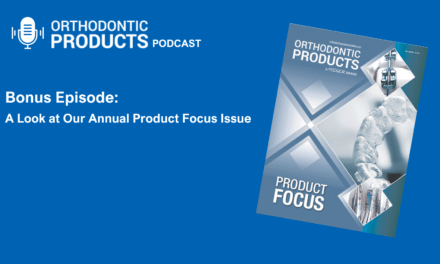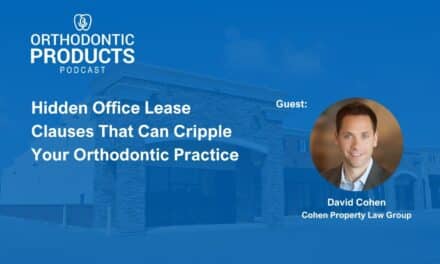Summary:
In this episode, Eric Cohen of Merchant Advocate explains the critical need for orthodontic practices to understand credit card processing fees. He emphasizes the impact of hidden fees and offers strategies to monitor and reduce costs, ultimately enhancing practice profitability and valuation.
Three Key Takeaways:
- Regular Monitoring is Essential: Orthodontic practices should review their credit card statements monthly. This helps identify and eliminate hidden or unjustified fees that can significantly impact profitability.
- Understand Processing Lingo and Fees: Practices must become familiar with the terms and fees associated with credit card processing. Misunderstanding these can lead to overpaying due to penalties or inflated costs.
- Maintain Good Payment Processing Hygiene: Reducing unnecessary fees not only saves money but also increases the practice’s valuation. This is especially important for practices planning to sell or transition in the near future.
This episode compliments a 4-part article series on payment processing fees: Part 1 talked about how credit card processors overcharge 72% of businesses. Part 2 talked about why skipping your annual PCI survey will cost your practice. Part 3 explained how to avoid unfair fees when your payment processor is embedded in your practice management software. Part 4 explains how good payment processing hygiene is crucial for maximizing the valuation of your orthodontic practice.
In the latest episode of the Orthodontic Products podcast, host Alison Werner delves into the often-overlooked world of credit card processing fees and their impact on orthodontic practices. She is joined by Eric Cohen, CEO and founder of Merchant Advocate, a company specializing in reducing credit card processing costs for businesses without requiring a change in processors.
Eric explains that credit card processing involves three main entities: banks, card networks (like Visa and MasterCard), and processors. While banks and card networks are regulated, processors are not, which often leads to hidden or inflated fees. These fees, presented in cryptic statements, can significantly impact a practice’s profitability.
The Complexity of Credit Card Statements
Cohen highlights that processors often insert miscellaneous fees that appear legitimate but are purely profit-driven. These can be especially problematic for orthodontic practices integrated with specific practice management software, which often ties them to particular processors with little transparency.
A notable issue discussed is the penalties for non-compliance with PCI (Payment Card Industry) standards. Practices might incur hefty fees if they fail to complete a complex annual survey, often written in technical jargon. Other fees can stem from improper account setups by processors, leading to unnecessary penalties.
Strategies to Avoid Hidden Fees and Penalties
Cohen advises practices to have their accounts monitored monthly, either internally by someone who understands the processing lingo or by a professional service like Merchant Advocate. This monitoring helps identify and eliminate unjustified fees. He also mentions that many practices miss significant savings because they don’t review or understand their statements thoroughly.
For new practices, Cohen suggests selecting patient management systems that allow flexibility in choosing credit card processors. This can prevent being locked into expensive and opaque processing agreements.
Lastly, Cohen underscores the importance of maintaining good payment processing hygiene, especially for practices considering a future sale. Reducing unnecessary fees can enhance the practice’s valuation, potentially increasing the sale price significantly.
In summary, understanding and managing credit card processing fees is crucial for orthodontic practices. Regular monitoring and a good grasp of the associated costs can lead to substantial savings and improved profitability. For more detailed guidance, read Cohen’s four-part article series linked above.
Podcast Transcript
Alison Werner
Hello, and welcome to the Orthodontic Products podcast. I’m your host, Alison Warner. Today we’re going to look at credit card processing fees specifically why you as small business owners need to understand the ins and outs of your credit card statements. The fact is these fees can not only affect your patient payment experience, but also your practice profitability. Joining me to talk about this is Eric Cohen, CEO and founder of Merchant Advocate, a company that helps businesses get the best credit card processing fees and rates. This podcast is actually part of a four part article series that Eric has written for us and will be available on our website and go more in depth on these issues. But to get an overview, we have Eric with us today, Eric, thanks for joining me.
Eric Cohen
Yeah, thank you for having us, Alison.
Alison Werner
So, to get started, can you tell our audience about what Merchant Advocate does?
Eric Cohen
Sure, so Merchant Advocate helps businesses reduce the cost of accepting credit cards, but without leaving their current processor, which is very, very important, especially in this industry. Our whole goal is, can we help the practice, eliminate any hidden fees, miscellaneous fees, things that should not be in their merchant statements, or increases, whatever they may be that drives the cost up? And again, I think the most important thing is we do this all without a practice leaving their current processor.
Alison Werner
Okay, so can you talk a little bit for those who aren’t familiar with how to credit card processing fees work within the orthodontic practice?
Eric Cohen
Yeah, so credit card processing fees? First of all, what everyone should know is that the credit card processing world is unregulated. Okay, so there’s three parts to it. There is the bank side, which is regulated there is Visa MasterCard, which has some rules. And American Express and Discover I just generalized Visa, MasterCard. But then there’s the processing side that has no regulation. And what happens is the processors will take the hard cost, and they’ll mark up the fees and send you a statement or actually don’t even send you the statement. The statements are online. And they’re cryptic, which means you don’t know the fees are going up. You don’t know what’s real, you don’t know this pure profit. Is it a visa fee? Is it not a visa fee? Very, very hard to decipher. It’s almost like 10 times worse than a cell phone bill. And I know most of us don’t understand our cell phone bills. And that’s what’s really important to understand is it’s a foreign language. I always say that if you don’t have a master’s in Merchant Services, you’re probably paying too much.
Alison Werner
Okay, so then what are the types of fees or ways that practices are kind of being, you know, losing money or paying more to do business? So I know there’s inflated processing fees? Let’s maybe start there.
Eric Cohen
Yeah, so what’s first of all, the fee is called your discount rate, which is surely not a discount. So it’s kind of misleading, a little bit there. But there are hidden fees. So there are percentages, there are transactions, there are extra costs, especially with recurring billing. orthodontic is big for real recurring billing. There are penalties. So what we all know is that when you don’t have the card present, most of us understand that the fees are higher. But what most practices don’t understand is there’s also penalties if you’re not set up correctly. Okay. And what we find in a single location or even multi locations is the credit card processors tend not to set up every account correctly. And it causes these penalty fees, or these miscellaneous fees. The other thing that we know about the industry is most practices are integrated into some sort of software, or practice management software. Now, the reason that’s important is most of the time, you only have one choice of who your credit card processor is when you’re in a software like this. And that’s where we come in: the credit card processors understand this. And one of the things that the way they make money is they will continue to raise the rates. Or they’ll add a new line item, right? There are line items that appear to be real Visa, MasterCard fees, because it kind of sounds like a fee. And when you call customer service, unfortunately, the rep will say yeah, that’s a real fee, when we know that they’re actually petted. So very, very easy for the processors to do this because no one really understands these merchant statements and they kind of get away with it. Okay.
Alison Werner
And then before we kind of get into how they combat that. There’s also an insurance angle here for how they could be seeing more fees or having more costs.
Eric Cohen
Yeah, so one of the things we’ve seen in the medical community in medical Dental is if you are taking insurance, we are seeing that insurance companies or third parties to insurance companies are now trying to remit payment for insurance via virtual credit card. And those virtual credit cards last more than every other credit card that’s out there. Now you don’t have to take them, you could push back on an insurance company. But there are ways to reduce those cards. So it’s really the insurance people or practices that take some sort of insurance and those companies that use third parties to remit payments, right, so you have to be really careful. And what we find is, practices will push back sometimes, but then all of a sudden, they start creeping up again and insurance companies. And when you think about it, these companies and their third parties, I mean, just like a consumer wants their miles and their points. They get miles and points every time they send you a card and use the card. Ah,
Alison Werner
okay. Okay, so then what’s the best way for an orthodontic practice to kind of find ways to save money on these credit card processing fees or combat these inflated fees? Where should they start? Yeah.
Eric Cohen
Well, I mean, they should probably use a company like honesty, but yeah, without, you know, using a sales approach, or it’s a, you know, I’m half joking there. But they really have to have their accounts monitored on a monthly basis, they have to have someone in the practice that understands the fees that understands the lingo that looks for, you know, penalties, even a penalty that that, you know, is easy to find is something called a non PCI fee. Right? You know, if you don’t answer what’s called a PCI survey, which is impossible to answer, because it’s written in a foreign language, your fee could be as little as $10 a month, we’ve seen up to $500 a month in penalties, right. And the reason people use a company like ours out there is we understand the language, we have technology that reads these statements. And if you’re not doing that on a monthly basis, if you’re not checking them, your processor is going to start increasing the rates. Right? And it’s really about learning the lingo, but also learning the rules behind it. Right? Like, why would you get charged, for example, the non PCI fee, which is supposed to answer a survey once a year? Or why is there, you know, an extra penalty fee on one of your transactions? Right. So I think the easiest way for them to really monitor this is to look at what their overall cost is. And a lot of times people are not looking at what their overall costs are. I mean, we have practices that will send their merchant statement. Well, first of all, we’ll ask them to send a merchant statement, and they’re like, where do we find them? Time? They don’t know where to find them. Okay. But what’s really important is, what are your overall costs? Right? What are you paying overall? Forget about all the details, what is that figure? And that’s something to monitor as well as to make sure that that is consistent. Now, obviously, you want to get it as low as possible. And you can always call a processor and ask for lower fees. But again, if you don’t understand the lingo, they’re gonna lower one fee. And then the next month, they’re gonna raise the fee back up somewhere else to make up for that. Okay.
Alison Werner
Okay. So what are some best, you know, oh, let you keep going. Sorry.
Eric Cohen
Yeah, one of the things I was going to say is people are going to hear this and say, Well, what do you mean, I signed the contract? How could they raise fees? Well, the Visa MasterCard guidelines says that a processor can change rates, whenever they want to change the rates, as long as they give you 30 days notice on the statement that most people don’t look at and don’t understand. So just because you signed up for a fee doesn’t mean that that’s what you’re gonna get long term, those fees can change as long as that process or gives you 30 days notice.
Alison Werner
Okay, so pay attention to those statements every month and read the fine print. What are some best practices? As you’re setting up a new practice, what are some best practices to help yourself at that point, and maybe avoid some of these extra costs?
Eric Cohen
I mean, it’s really hard because when you’re setting up a practice, I was saying before, most practices are integrated into some sort of patient management system or patient billing system. And they don’t really have a choice of what credit card company to use. So we think especially if you have recurring billing, I think the most important thing is find out who is using that company, maybe find a peer choosing the company that has some low rates. Again, they could always call us if they choose to but you know, they want to go about it and find out, you know, before they buy a system, right? So it starts with the system they’re going to use. So if it’s a new practice, you want to try to find an EMR, right, that allows you to use more than one processor. And there’s not many of them. But if you can’t find that, you always want to talk to someone that uses the EMR, right? Because most of the EMRs out there will integrate the credit card processing. And once you’re integrated, and have recurring billing, you’re not unraveling it, you’re stuck. Okay, so you really want to talk to some peers as well, what’s the best system is the credit card processor, easy to deal with? And a, most of them are gonna say no, because a lot of them are very, very hard to deal with. And also, again, make sure that they have someone on staff that could monitor these accounts, or using a company to again, monitor the accounts. It’s really, really important, because if you think about it, if you’re paying 2% Too much, I’m not saying 2%. All in all I’m saying if you’re paying 2% Too much, that’s on your gross sales, that could be five, six, 10% of your net profit. That’s being taken out. Right, so a lot of times we hear you know, I’m only paying an extra half a percent. But that’s on your gross sales. What’s that mean? Out of your bottom line?
Alison Werner
Yeah, okay. Well, kind of extending from that is, one of the things you write about in the article series we’re going to be putting on the website is about having good payment processing hygiene, when it comes to your practice valuation, especially when it comes time to sell or have some kind of transition. Can you talk a little bit more about that?
Eric Cohen
Yeah, so we’re obviously seeing in the medical world, there’s a lot of roll ups, there are a lot of sales happening, a lot of private equity has come into the market. And you know, we hear it in any medical field, but we’re seeing it in dental as well. You know, if you’re overpaying, if you’re a practice that, let’s say is, you know, doing a couple, couple million dollars a year, right or million dollars a year, and you’re gonna sell your company, or sell your practice, you’re gonna get valued based off of EBIT, you’re gonna get valued off of earnings, and maybe you’ll get a five or a seven or 10, I’m not really sure what the multiples are in your industry here. But if you lower the cost of your credit card processing, it’s going to increase your overall valuation when you go to sell. So if you’re in a spot today, where you’re saying, You know what, I may exit in six months, or I may exit in two years, or maybe I’m getting towards the end of wanting to practice, right, there’s a subset of practice, and doctors and dentists that know that that’s coming. Yeah, they should clean up their merchant account as soon as possible. Right, because if they say, for example, if they save, I don’t know, $30,000 a year, that can mean a couple $100,000 in increased valuation, when they go to sell their practice. Right now, the PE firms and the people buying them understand this, right? They understand that if they look at something, some of them are smart enough to know, oh, we could reduce the credit card service, right? And the reason I know this is we work with a couple of these firms that look at this and have due diligence before buying and seeing if there’s value there. But if you’re, you know, if you own the practice, you want to look at all of your contracts. But this is one that I would say 90 plus percent of your revenue is probably credit cards in today’s world. Yeah, this is one of those easy fixes. That is not let’s say 500 a month, it’s let’s increase your value by 234 $100,000 when you’re going to exit, so I think that anyone that has in that mind frame, whether it’s six months or a couple years or something coming up, this is an area to really look at. Absolutely. Okay. Well,
Alison Werner
Before we wrap up, are there any last words you have for our audience in terms of what they should be thinking about in terms of saving themselves these costs?
Eric Cohen
Yeah, I think one of the best pieces of advice is, you know, we all need to accept credit cards, there’s no question about that. The credit card salesperson that’s selling is not your friend. Okay? The way the credit card industry works is, the salesperson in the company earns a percentage of every transaction, the more they charge you, the more money they’re going to make every month. So you really have to scrutinize those relationships, especially when we’re talking about new practices. Very, very, very important. You also want to make sure that you’re not getting these penalties or you’re not getting, you know, a semi annual fee or, you know, we’ve even seen things in in this industry where there’s a line item for some service that is let’s say A reputation management service that the credit card processors resell. And they bill you for it, but you don’t even know about it. You don’t even know how it works. So it’s really, really important for every line item to be scrutinized on this thing. And, you know, you said to use good hygiene. I mean, that’s kind of a perfect way of saying it. This is one of those areas where it’s very easy for people to take more money than they should. And again, that’s why we exist, I think. Yeah, Merchant Advocate was created for transparency and really helping the business owner and not get, you know, taken advantage of by these large processors. That’s why the company exists today. Yeah. Well,
Alison Werner
And it just seems like most orthodontic practices that are small businesses. And so like you said, they’re the small fish working with a very big pond. Well, Eric, thank you so much for speaking with me today. And you can find Eric’s four part series that he wrote for us on our website. And if you want to learn more about Merchant Advocate, merchant-advocate.com is the website.
Eric Cohen
Yes, no S’s, just merchant-advocate.com.
Alison Werner
All right. Well, thank you, Eric. I appreciate it.
Eric Cohen
Thank you for having us.













